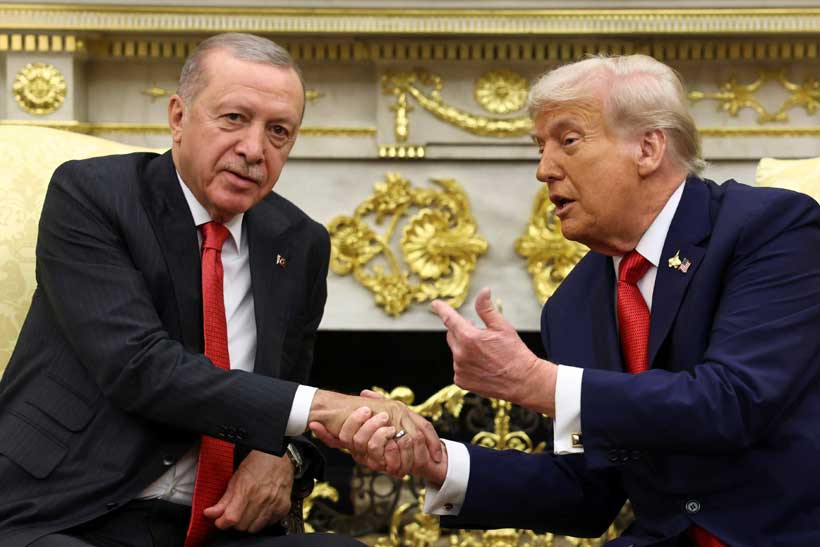The Mehter, which shook enemies with the drums of the Ottoman Empire, is one of the world’s oldest military bands. Today, the Mehter still takes center stage at Türkiye’s important days and celebrations. The 600-year-old profound history of the Ottoman Empire, which spanned three continents, led to the composition of the epic and passionate Mehter Marches. Even listening to the march evokes romantic memories that fill Turks with pride. With the Justice and Development Party (AKP) coming to power in Türkiye, figures associated with the Ottoman Empire have come to the fore. These figures can be seen, particularly when President Recep Tayyip Erdoğan hosts foreign heads of state at the Presidential Complex of Türkiye. As interesting as the Mehter band is the Mehter’s march. When marching, the Mehter takes three steps, pauses, then takes three steps to the front left, pauses again, and turns to the right. Now, the article explains the connection between Turkish foreign policy and the Mehter. Turkish foreign policy is like the Mehter march. After Türkiye’s three steps towards Asia, consisting of BRICS, the SCO, and the Türkiye-Russia-China Alliance, it is now time to turn its face back to the other side. Looking at President Erdoğan’s meeting with US President Donald Trump and the agreements they signed, it seems that Türkiye is now about to take three steps towards the West. Before Erdoğan set off for New York to attend the 80th UN General Assembly, his political ally, Nationalist Movement Party (MHP) leader Devlet Bahçeli, announced the Türkiye-Russia-China (TRC) Alliance against the US-Israel axis of evil. The Erdoğan-Trump meeting marked a return to the West, with Türkiye aiming for $100 billion in trade volume with the US. This included lifting the CAATSA sanctions imposed over the S-400 purchase, Türkiye rejoining the F-35 program, purchasing 225 Boeing passenger aircraft, long-term LNG purchases from the US, and a nuclear cooperation agreement. Following Türkiye’s desire to join the SCO and BRICS, this agreement with the US brought to the fore the question of whether relations with the US had entered a new phase after the crisis. Even US President Trump’s emphasis on “The best thing he could do is not buy oil and gas from Russia” is significant. Another important point is the sudden resumption of crude oil flows from Iraq to Türkiye after this statement. Energy was one of the most important areas of cooperation between Türkiye and Russia. Sixty percent of Türkiye’s oil imports and 40 percent of its natural gas imports come from Russia. Türkiye has strategic areas of cooperation with Russia in the TurkStream and Blue Stream pipelines and the Akkuyu nuclear power plant, which is under construction in Mersin. The issues signed and agreed upon between Türkiye and the US are intended to seriously disrupt Turkish-Russian relations. At the same time, the lifting of CAATSA sanctions imposed on Türkiye for acquiring the S-400 air defense system from Russia proves that Turkish-Russian relations are being targeted.
Donald Trump’s re-election as president in the US was welcomed with joy by AKP officials. One wing of the AKP had consistently advocated for the reestablishment of positive Turkish-US relations. Erdoğan’s political ally Bahçeli’s rhetoric about a Türkiye-Russia-China (TRC) Alliance, suggesting that Türkiye could seriously turn to Asia if relations with the US did not improve, was taken seriously by Washington. This is because when Turkish journalists asked Erdoğan about the TRC alliance in New York, he acted as if he had never heard of it. On the other hand, US Ambassador to Ankara Tom Barack’s statement that Trump “gives him legitimacy” to Erdoğan also shows how the US interprets Erdoğan.
Conclusion
In conclusion, Türkiye’s current situation resembles a Mehter march. On the one hand, Türkiye says it is seeking alternatives outside the West and is dissatisfied with the current international order, while on the other hand, it is attempting to repair its relations with the US, which will damage its relations with Russia and China. It was often said that Türkiye was pursuing a balance policy and a policy of positive engagement with both sides. However, it is necessary to refer to Erdoğan’s once-stated view that “If you aren’ton one side, you will be eliminated.” If the so-called balance policy is merely expediency, this situation could seriously damage Türkiye’s international credibility. Türkiye urgently needs to put forward a decisive foreign policy program and position itself according to the changing dynamics of the world and the external threats directed at Türkiye. Considering that the world’s productive forces and balances are shifting towards Asian countries, Türkiye’s place can only be in a just order and a world of the oppressed, the Global South.
The views contained in this article are the author’s alone and do not represent the views of Shanghai University.
